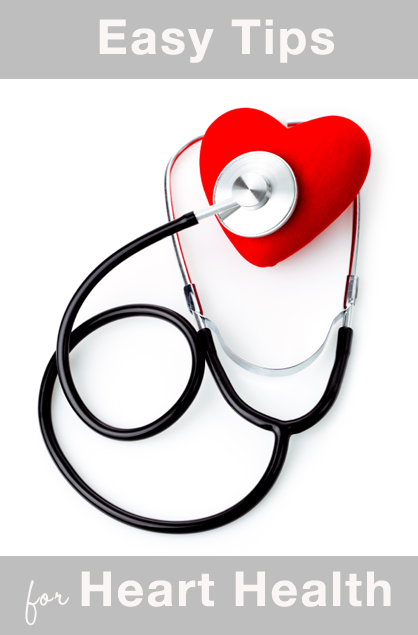Your Heart-Healthy Diet
More deadly than all forms of cancer, heart disease is the leading cause of death for women over the age of 50, causing one in three deaths. Protect your ticker with these heart health diet tips from nutritionist Keri Glassman. With these simple suggestions on how to eat right, you can beat the odds.
What you put in your body matters. Some of the top risk factors for heart disease stem from the diet and diet-related problems: poor cholesterol profile (low HDL and high LDL levels), high blood pressure and obesity.
“The good news is, there are many risk factors you can control to lower your risk – and the biggest factor you can control is eating right. In other words, eating for your heart!” Glassman, author of “O2 Diet” and “New You and Improved Diet,” said. “Our food choices have the power to decrease our cholesterol, blood pressure and body weight, thereby reducing our risk for cardiovascular problems.”
EAT THE RIGHT DIET
Heart health starts with your diet. In fact, Glassman believes that following an overall healthy diet is the best way to protect your heart. Put the following on your menu.
Choose Whole Grains
Choosing whole grain options over refined grains can cut your risk of heart disease by a whopping 25 to 28 percent. When at the supermarket, steer clear of refined grains, especially those found in white bread and other bakery products such as muffins and cakes. Instead, opt for heart healthy oatmeal, high-fiber cereal or brown rice, or expand your horizons with a new grain choice such as quinoa or barley. Look for the labels that say “100-percent whole grain.”
Add Omega-3s
Omega-3 fatty acids are key for optimal heart health because of their anti-inflammatory properties. Fresh fish, especially salmon, and flaxseed contain these omega-3 fatty acids, which lower the bad cholesterol and raise the good cholesterol. Omega-3s slow intravascular clotting, aiding in preventing stroke and heart attacks and dilating the blood vessels, which prevents high blood pressure. They also decrease triglyceride levels, stabilize irregular heartbeat, and act as natural blood thinners.
Lower Your Sodium
High sodium intake is linked to hypertension, a known risk factor for heart disease. So skip that dash of salt and go for some fresh herbs or experiment with exotic spices. If you do purchase salty processed foods, be especially wary of canned and frozen food. Packaged items claiming to be “low sodium” are often simply 25 percent lower than the original version.
Eat Plenty of Fruits and Vegetables
Studies have repeatedly proven that higher consumption of fruits and vegetables is associated with a lower incidence of cardiovascular disease. Fresh product is full of antioxidants such as vitamins C and E and beta carotene, compounds that fight oxidation in the body, basically preventing damage to the arteries. Some of the best choices are berries, citrus fruits, tomatoes, dark green leafy vegetables such as kale and spinach, sweet potatoes, carrots and pomegranate juice. Add some dash to your diet with exotic choices such as antioxidant-rich fruits like mangosteen, guava, and acai.
Up Your Fiber Intake
Soluble fiber is known to lower cholesterol. The best sources of fiber are fresh fruits, vegetable and whole grains. Try for 30 grams per day, in fiber-filled choices such as fresh fruits with skin, dark greens, legumes, high-fiber cereals, oatmeal and ground flaxseed. Go with steel cut oatmeal for breakfast, add legumes and a slice of whole grain bread to lunch, and then choose a high-fiber grain for dinner.
Lean Protein is Best
Fat and heart health don’t good hand and hand. Meat choices can be laden with artery-clogging saturated fat, which leads to plaque build-up in the arteries. Put leaner choices on your plate, such as white meat chicken, turkey, and lower-fat fish like halibut, trout and sole, and trim off any visible fat.
Go with Healthy Fats
To lower your risk of heart disease, cut down on saturated and trans fat, especially butter and margarine, and try for a low-fat diet. Monosaturated fats, like olive oil and canola oil, or polysaturated ones, such as nuts and seeds, can be used when necessary in moderation and may even lower your cholesterol. High cholesterol can promote plaque buildup that increases your risk of heart attack and stroke. Glassman recommends walnuts, almonds, and pecans as easy on-the-go snacks that can provide the right kind of fat for your heart.
ADD THESE HEART-HEALTHY FOODS
- Asparagus
These green skinnies are extremely high in folate, crucial for a healthy cardiovascular system.
- Cherries
Dark cherries’ anthocyanin reduces inflammation, lowering cholesterol and triglyceride levels.
- Dark Chocolate
The flavonoids in chocolate promotes heart health through reducing platelet activation, relaxing the blood vessels and affecting the balance of the hormone-like eicosanoids compounds, known to be active in cardiovascular health.
- Red Grapes
The skin of the grapes contains phenol compounds, which reduce inflammation, promoting a healthy heart.
- Hibiscus Tea
Researchers discovered that individuals with high blood pressure lowered their blood pressure significantly after drinking three cups of this brew a day.
- Oregano
This antioxidant-rich herb contains beta-caryophyllene, thought to reduce inflammation.
- Pistachios
These green nuts are full of plant sterols, which researchers think can lower the risk of cardiovascular disease.
- Red Wine
For those who like to enjoy a glass every now and then, a compound in red wine upps high-density lipoprotein, or HDL, the “good” cholesterol.
- Tomatoes
Tomatoes are full of the antioxidant lycopene, whose high levels are linked to low levels of heart disease.
Tagged in: lux exclusives, wellness, food, nutrition, health, diet, heart health,

LadyLUX



